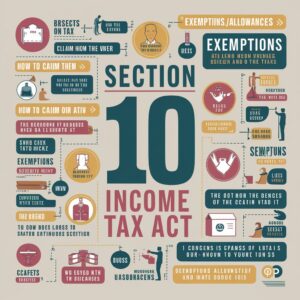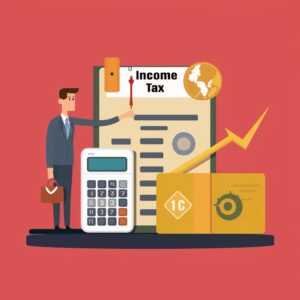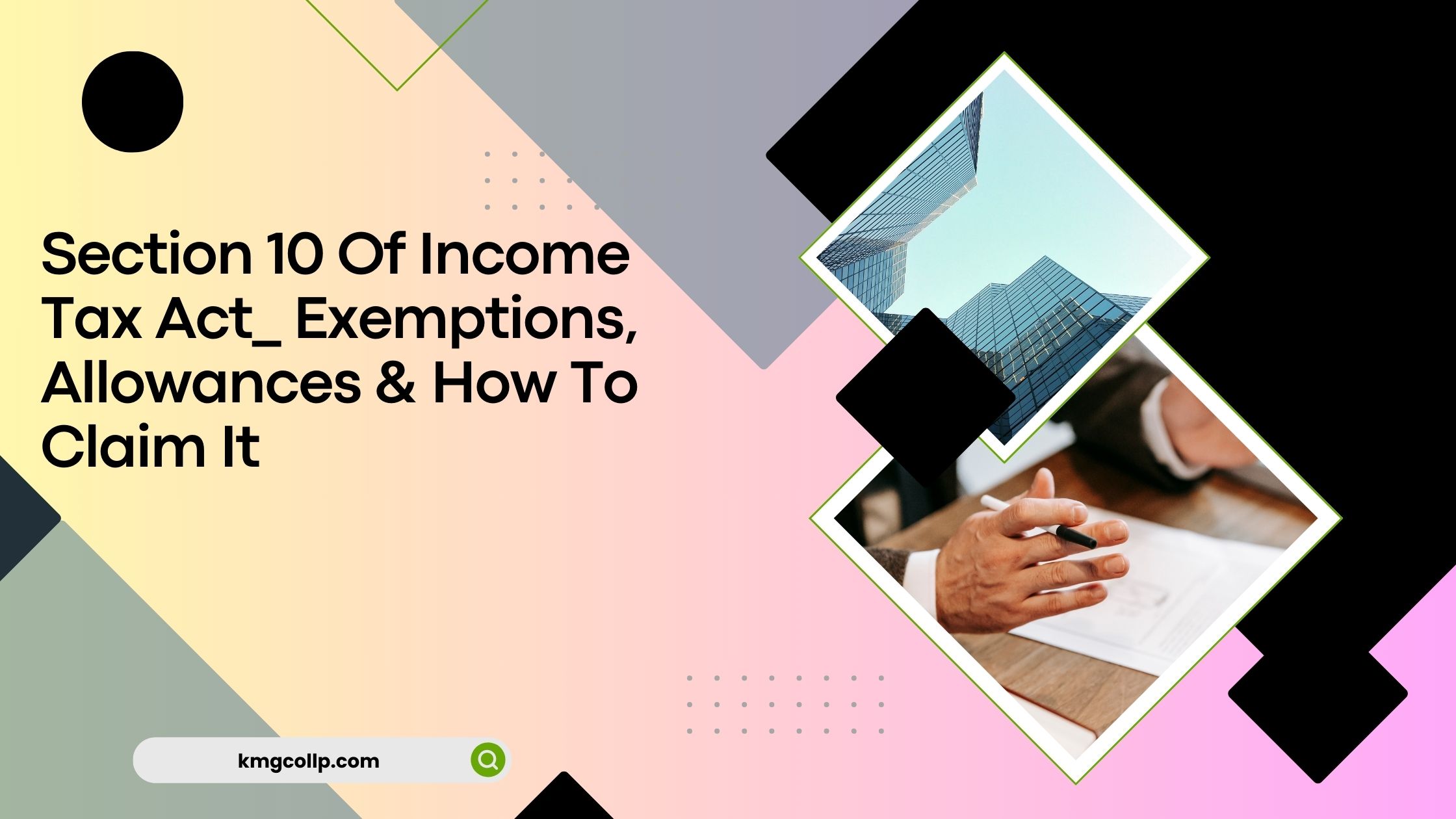Hello Folks!!!
Today, we are going to discuss about the Section 10 of Income Tax Act,
The Government of India offers various exemptions to help reduce your income tax burden. Section 10 of the Income-tax Act, 1961 outlines these exemptions, detailing the conditions and terms under which you can benefit from them.
Here’s an overview:
What is Section 10 of the Income Tax Act?
Section 10 of the Income-tax Act, 1961 identifies specific sources of income that are not included in the total taxable income. This section encompasses various exemptions available to taxpayers, helping them lower their tax liability. We provide the best ITR filing services.
Exemptions Under Section 10:
Section 10(13A) – House Rent Allowance (HRA):
HRA is provided to cover house rent expenses. The exemption applies to the least of the following amounts:
- Actual HRA received.
- 50% of [basic salary + DA] for those in metropolitan cities (Delhi, Mumbai, Chennai, Kolkata) or 40% for other cities.
- Actual rent paid minus 10% of [basic salary + DA].
Expenses eligible for HRA exemption include:
- Rent paid.
- Brokerage or commission for securing rented accommodation.
- Maintenance charges for the rented property.
- Costs related to the lease agreement.

Section 10(5) – Leave Travel Allowance (LTA):
Exemption applies to domestic travel expenses like airfare, train, or bus fare, but not for expenses like transportation at the destination, sightseeing, or food. The exemption is limited to the LTA amount provided by the employer.
Example: If the LTA is ₹30,000 and travel expenses are ₹20,000, only ₹20,000 is exempt.
Section 10(14)(i) – Business Expenses:
Exemption covers expenses incurred due to the employer’s business, including travel, conveyance, and research allowances, provided they are spent for the intended purpose.
Section 10(11) – Provident Fund Interest:
Exemption applies to interest from a provident fund upon resignation or retirement. Note that as of April 1, 2021, interest on contributions exceeding ₹2,50,000 in any year is not exempt.
Section 10(34) – Dividend Income:
Dividends from Indian companies are exempt up to ₹10,000. Income exceeding this amount is taxable. This exemption applies only to dividends received until March 31, 2020.
Section 10(26) – Scheduled Tribe Members:
Members of Scheduled Tribes in Nagaland, Tripura, Mizoram, Arunachal Pradesh, and Manipur are exempt from tax on income earned in these states or from dividends and interest on securities.
Section 10(26AAA) – Sikkimese Individuals:
Sikkimese individuals are exempt from tax on income earned within Sikkim or from dividends and interest on securities.
Section 10(38) – Long-Term Capital Gains:
Exemption applies to long-term capital gains from selling equity shares or equity-oriented mutual funds, provided Securities Transaction Tax is paid. Applicable only to gains earned until March 31, 2018. For any queries, contact us!
Section 10(23C) – Educational and Medical Institutions:
Institutions with annual receipts not exceeding ₹5 crore are eligible for exemption.

Section 10(37) – Compulsory Acquisition of Urban Agricultural Land:
Exemption for capital gains from the compulsory acquisition of urban agricultural land if it was used for agricultural purposes for at least two years before the sale.
Section 10(10A) – Government Employee Pensions:
Exemption applies to pension received by government employees.
Section 10(10D) – Life Insurance Income:
Exemption for income from life insurance policies, except for policies on specially-abled dependents, key man insurance, or policies with premiums exceeding 10% of the sum assured.
Section 10(35) – Mutual Fund Units:
Income from the sale of specified mutual fund units is exempt. This applies only to income earned until March 31, 2020.
Section 10(10) – Gratuity:
Gratuity received by government employees is exempt. For private sector employees, exemption depends on coverage under the Payment of Gratuity Act.
Internet Allowance:
Under Section 10(14), internet allowance provided by the employer is exempt.
Food Allowance:
Section 10(14) also offers a tax exemption of ₹26,400 per year for food allowance, assuming two meals a day and 22 working days per month.
How to Claim Section 10 Exemptions:
To claim exemptions, file your income tax return, disclosing the income earned and the applicable exemptions.
Leave Encashment:
Leave encashment received during employment is taxable. Government employees are exempt from tax on leave encashment at the time of resignation or retirement. Private sector employees are taxed on leave encashment but can avail exemptions under Section 10(10AA).
Understanding and utilizing these exemptions can help in reducing your tax liability. For personalized advice, consult a tax professional before filing your claims.
FAQ’s
Is the House Rent Allowance (HRA) Fully Exempt from Taxation?
No, HRA is not fully exempt from taxation. Section 10(13A) of the Income Tax Act provides partial exemptions for HRA, with specific limitations based on factors such as actual HRA received, rent paid, and the location of your residence.
What Does Section 10(9) Exempt?
Section 10(9) exempts the income of family members of foreign employees participating in the Cooperative Technical Assistance Program.
Is the Amount Received from Sukanya Samriddhi Account at Maturity Exempt?
Yes, the amount received upon maturity of the Sukanya Samriddhi Account is fully exempt from tax, without any limit.
Will I Be Eligible to Claim Exemptions Under Section 10 if I Opt for the New Tax Regime?
No, if you opt for the new tax regime, you will not be eligible to claim exemptions under Section 10.
What is the Eligibility Criteria for Section 10(10D)?
To be eligible for exemptions under Section 10(10D), you must have a life insurance policy. The value received upon the policy’s maturity, including any bonuses, can be claimed as an exemption.
What does Section 10 of the Income Tax Act cover?
Section 10 of the Income Tax Act outlines various types of income that are exempt from taxation. This includes specific allowances, exemptions on dividends, capital gains, and other incomes under various conditions.
What are some common exemptions under Section 10?
Common exemptions under Section 10 include House Rent Allowance (HRA), Leave Travel Allowance (LTA), income from a Sukanya Samriddhi Account, and certain types of income for Scheduled Tribe members.
How is House Rent Allowance (HRA) calculated for tax exemption?
HRA exemption is calculated based on the least of the following amounts:
- Actual HRA received.
- 50% of [basic salary + DA] for metro cities (or 40% for other cities).
- Actual rent paid minus 10% of [basic salary + DA].
Can I claim Section 10 exemptions if I opt for the new tax regime?
No, if you choose the new tax regime with lower tax rates, you will not be eligible to claim exemptions under Section 10. The new regime does not allow for deductions or exemptions.
How do I claim exemptions under Section 10 on my income tax return?
To claim exemptions under Section 10, you need to disclose the relevant income and corresponding exemptions while filing your income tax return. Ensure you have the necessary documentation to support your claims and consult a tax professional if needed.
Disclaimer: The materials provided herein are for informational purposes only and do not constitute legal, financial, or professional advice. Consult relevant laws and experts before acting on this information. Neither the author nor K M GATECHA & CO LLP is liable for any inaccuracies or omissions. This material is purely educational and not an advertisement or solicitation.
Table of Contents
Toggle



